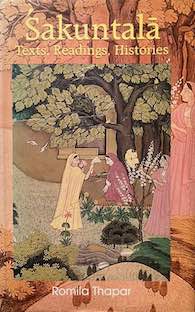Prof. Romila Thapar, during an Interactive Workshop chaired by Prof. Rustom Bharucha, highlights the dangers arising from misrepresenting ‘narratives’ as ‘history’.
“Every society had narratives about its past and some regarded them as history as time went on […] The one thing you must remember about the past is that it is very delicate in terms of what present politics can do to it. […] And it is usually the oldest period when you have very little evidence, it is difficult to check the evidence […] So your fantasy runs wild, you can concoct a utopia exactly as you want.”
Romila Thapar (Emeritus Professor of History, Jawaharlal Nehru University), during an interactive workshop on 22 August 2013 responding to a participant’s question: “Is there also the risk of creating fake history through the invention of tradition?” [1h41m55s]: https://youtu.be/QZU0G0P3Elw?t=1h41m55s
Sociology Seminar Series is an academic program of the Department of Sociology, Faculty of Social Sciences, South Asian University (New Delhi, India), to bring about fusion of intellectual horizons in hermeneutic sense and sustained academic culture of debate and deliberation. As part of this program, scholars of all rank and file, from across disciplinary orientations, present their research papers/lectures for an audience which subsumes scholars from South Asian University as well as from other Delhi-based academic institutions. Beginning in June 2011, structured in bipartite division as per two semesters in each academic year, the program has been successful in creating a vibrant intellectual kinship within and beyond South Asia. It aims at generating conducive intellectual controversies and charting ideational paths for innovations in academic imagination.
Source: sau sociologyseminar – YouTube
Published on Sep 30, 2013
An Interactive Workshop with Prof. Romila Thapar
Address: https://youtu.be/QZU0G0P3Elw
Date Visited: 5 August 2020
The pageant of Indian history is the grandest that the history of any country can offer. The history of India began when man first appeared on the globe. Since then, the Indian people alone of the peoples of the various countries of the earth have been progressing without interruption in handicraft, physical sciences applied to manual industries, art work on wood, stone and ivory, social amelioration and religious experience. The civilization of India alone has progressed for countless millenniums without being prematurely choked out of existence by the desiccation of the soil or the drying up of the nobler springs of human action, by the spread of malaria or the moral decadence of the people. It is true that the progress of culture in India, though continuous, was not uniform. It did not proceed in a straight line, but in undulations like the waves of the sea. Sometimes the crest of the wave of progress was tall; at other times the trough between two waves was very broad but there has been always progress and never retrogression.
Source: Introduction to The Stone Age in India by P.T. Srinivasa Ayyangar (S. Subrahmanya Ayyar Lecture, 10 December 1925), Government Press Madras, 1926
URL: http://www.worldcat.org/oclc/38147053
Up-to-date reports by Indian journalists and commentators
To search Indian periodicals, magazines, web portals and other sources safely, click here. To find an Indian PhD thesis on a particular tribal community, region and related issues, click here >>
Search tips
Combine the name of any particular state, language or region with that of any tribal (Adivasi) community.
Add keywords of special interest (music, poetry, dance just as health, sacred grove and biodiversity); learn about the rights of Scheduled Tribes such as the “Forest Rights Act” (FRA); and the United Nations “Declaration on the Rights of Indigenous Peoples”, “Universal Declaration of Human Rights”, “women’s rights”, or “children’s right to education”.
Ask a question that includes “tribal” or “Adivasi”, for instance: “Adivasi way of life better?” (or “tribal way of life worse?”)
Specify any particular issue or news item (biodiversity, bonded labour and human trafficking, climate change, ecology, economic development, ethnobotany, ethnomedicine, global warming, hunter-gatherers in a particular region or state, prevention of rural poverty, water access).
For official figures include “scheduled tribe ST” along with a union state or region: e.g. “Chhattisgarh ST community”, “Himalayan tribe”, “Scheduled tribe Tamil Nadu census”, “ST Kerala census”, “Particularly Vulnerable Tribal Group Jharkhand”, “PVTG Rajasthan”, “Adivasi ST Kerala”, “Adibasi ST West Bengal” etc.
In case the Google Custom Search window is not displayed here try the following: (1) toggle between “Reader” and regular viewing; (2) in your browser’s Security settings select “Enable JavaScript” | More tips >>
Note: hyperlinks and quotes are meant for fact-checking and information purposes only | Disclaimer >>
Learn more
A constitution which guarantees: “The State shall not discriminate against any citizen”
Adivasi (Adibasi) | Usage in legal and historical records, in textbooks, scholarly papers and the media – Classifications in different states
Adivasis in India’s Freedom struggle
Ambedkar was more than the drafter of the Constitution
Colonial policies | Freedom Struggle | Independence
Constitution and Supreme Court
eBook | Background guide for education
eBook | “Where the mind is without fear”: Tagore, Gitanjali and the Nobel Prize
Education and literacy | Right to education
History | Struggle for India’s freedom | Time now to undo the historical injustice
Misconceptions | “Casteism” and its effect on tribal communities
